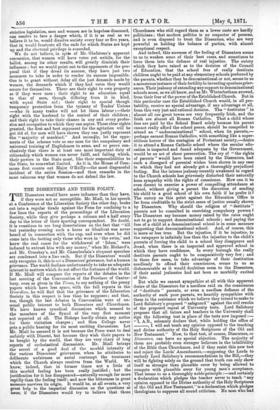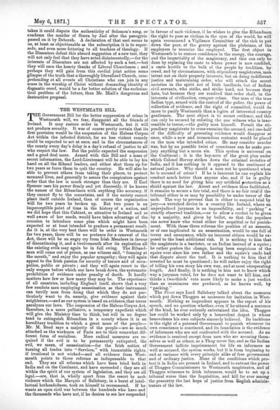THE DISSENTERS AND THEIR POLICY.
THE Dissenters would have more influence than they have, if they were not so susceptible. Mr. Miall, in his speech at a Conference of the Liberation Society the other day, broke out into a regular tirade against the Press for confining to a few lines the reports of the proceedings of the Liberation Society, while they give perhaps a column and a half every day to the letter of their sporting correspondent. No doubt, it is vexatious to see long dissertations on the fact that "till but yesterday evening such a horse as Glenlivat was never heard of in connection with the cup, and even when he did come into the betting only those who were in the swim,' and
knew the real cause for the withdrawal of were induced to entrust him with any money," when Mr. Richard's, and Mr. Crosskey's, and Mr. Chamberlain's eloquent speeches are condensed into a line each. But if the Dissenters' would only recognize it, this is not a Dissenters' grievance, but a human grievance. The world declines unfortunately to take an adequate interest in matters which do not affect the fortunes of the world. If Mr. Miall will compare the reports of the debates in the last meeting of the Convocation of the Province of Canter- bury, even as given in the Times, to say nothing of the penny papers which have less space, with the full reports in the Guardian, he will find that the grievance of the Liberation Society in this respect is less than he supposes ; and that, too, though the last debates in Convocation were of un- usual public interest to both Dissenters and Churchmen. We have known synodical discussions which seemed to the members of the Synod of the very first moment not reported at all. The Bishops hardly obtain any notice for their visitation charges ; and Sion College never gets a public hearing for its most exciting discussions. Let Mr. Miall be assured it is not because the Press want to deal unfairly with Dissent, but because they wish their papers to be bought by the world, that they are very chary of long reports of ecclesiastical discussions. Mr. Mall betrays the secret of a good deal of the morbid intensity of the various Dissenters' grievances, when he attributes to deliberate unfairness or social contempt the treatment which the Church always receives from the World. We know, indeed, that in former times not a little of this morbid feeling has been really justified ; but the justification for it has disappeared—naturally enough far more rapidly than the feeling itself; and now the bitterness in great measure survives its origin. It would be, at all events, a very great help to the impartial discussion on the questions at issue, if the Dissenters would try to believe that those Churchmen who still regard them as a lower caste are hardly politicians ; that modern politics is no respecter of persons, and is even disposed to treat the Dissenters, who are very powerful as holding the balance of parties, with almost exceptional respect.
And indeed, this soreness of the feeling of Dissenters seems to us to weaken some of their best cases, and sometimes to force them into the defence of real injustice. The outcry which they have raised as to the decision of the Council of Education, that the school fees of really destitute children ought to be paid at any elementary schools preferred by the parents, whether they be denominational or not, seems to us a monstrous instance of their fertility in inventing spurious griev- awes. Their jealousy of extending any support to denominational schools arose, as we all know, and as Mr. Winterbotham avowed, from their fear of the power of the Established Church. But in this particular case the Established Church would, in all pro- bability, receive no special advantage, if any advantage at all, from this very just and rational decision. Tha " destitutes " in almost all our great towns are very frequently Irish, and the Irish are almost all Roman Catholics. That a child whose fees are paid by the School Board solely because his parent cannot really afford the school pence, should be compelled to attend an " undenominational " school, when its parents,— perhaps earnest Roman Catholics, with something like a super- stitious horror of the contagion of Protestant society,—desire it to attend a Roman Catholic school where the secular edu- cation is inspected and found adequate by the Government, would be an act of sheer persecution. The cry of "the rights of parents" would have been raised by the Dissenters, had such a disregard of parental wishes been shown in any case in which they had not already got a thoroughly prejudiced feeling. But the intense jealousy recently awakened in regard to the Church schools has grievously disturbed their naturally keen sympathy with the rights of conscience. How can it be even decent to exercise a power of compelling attendance at school, without giving a parent the discretion of sending his child to a good school of his own faith if he prefer it ? The outcry on this point against the Education Office is far from creditable to the strict sense of justice usually shown by Dissenters. Why should the religion of " destitute " parents not be consulted in exercising compulsory powers ? The Dissenters say because money raised by the rates ought not to go to support denominational schools ; and paying the fees of a child at a denominational school is in some measure supporting that denominational school. And, of course, this is more or less true. But the injustice, if it be injustice, to the ratepayer is infinitely less than the injustice to the child's parents of forcing the child to a school they disapprove and dread, when there is an inspected and approved school in which they have confidence. In every borough the really destitute parents ought to be comparatively very few ; and in those few cases, to take advantage of their destitution needlessly to offend their consciences, seems to us as dishonourable as it would doubtless seem to the Dissenters, if their social jealousies had not been so morbidly excited of late.
But while we cannot sympathize at all with this apparent desire of the Dissenters for a needless raid on the consciences of "destitute " parents, or even a needless defiance of the authority of such poor parents, we heartily sympathize with them in the resistance which we believe they intend to make to Lord Salisbury's proposed " safeguard " against the evil results of the proposed repeal of University tests. Lord Salisbury proposes that all tutors and teachers in the University shall sign the following test in place of the tests now imposed :— "I, A.B., solemnly declare that, while holding the office of , I will not teach any opinion opposed to the teaching and divine authority of the Holy Scriptures of the Old and New Testament." Now, to that test, of course, Dissenters, as Dissenters, can have no special objection. The majority of them are probably even stronger believers in the infallibility of the Bible than Churchmen, and if they resist this new test and reject the Lords' Amendments,—supposing the Lords to embody Lord Salisbury's recommendations in the Bill,—they will be fighting solely on the ground that truth can only show itself as stronger than plausible error by being allowed to compete with plausible error for young men's acceptance. That seems to us a thoroughly noble principle :—and certainly a declaration which pledges the teacher never to teach "any opinion opposed to the Divine authority of the Holy Scriptures of the Old and New Testament," is a declaration which pledges theologians to suppress all sound criticism. No man who had
taken it could dispute the authenticity of Solomon's song, or condemn the murder of Sisera by Jael after the panegyric passed on it by Deborah. A declaration of that sort seems to us, at least as objectionable as the subscription it is to super- sede, and even more fettering to all teachers of theology. If the Dissenters defeat this absurd suggestion of a new test, they will not only feel that they have acted disinterestedly,—for the interests of Dissenters are not affected by such a test, —but they will earn the hearty thanks of Liberal Churchmen ; and perhaps they will gain from this cordial joint action some glimpse of the truth that a thoroughly liberalized Church, com- prehending at all events all Christians who can join in any sense in the worship of Christ without demanding identity of dogmatic creed, would be a far better solution of the ecclesias- tical problem of the future, than Mr. Miall's dangerous and destructive proposal.

































 Previous page
Previous page